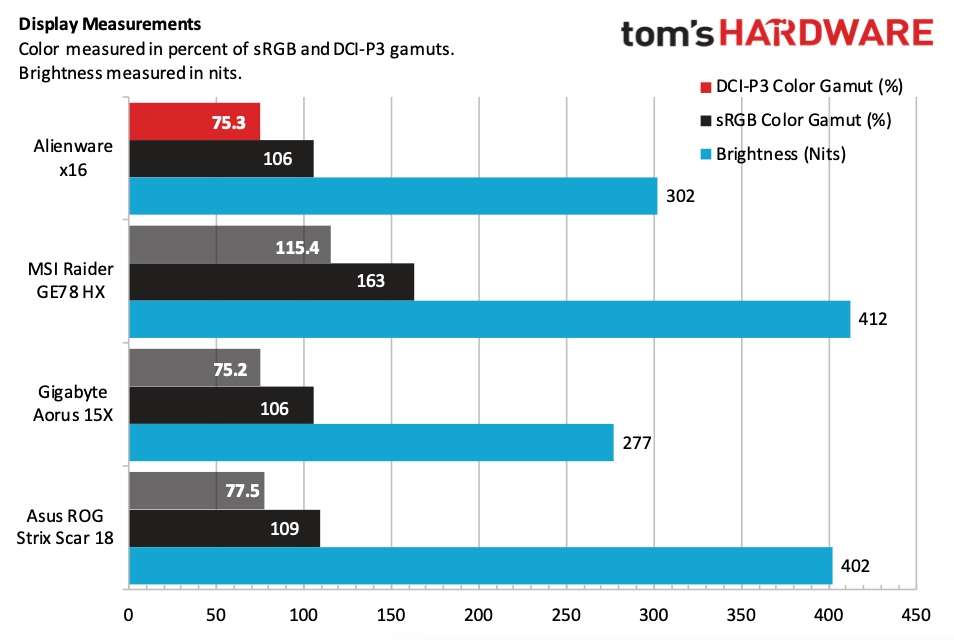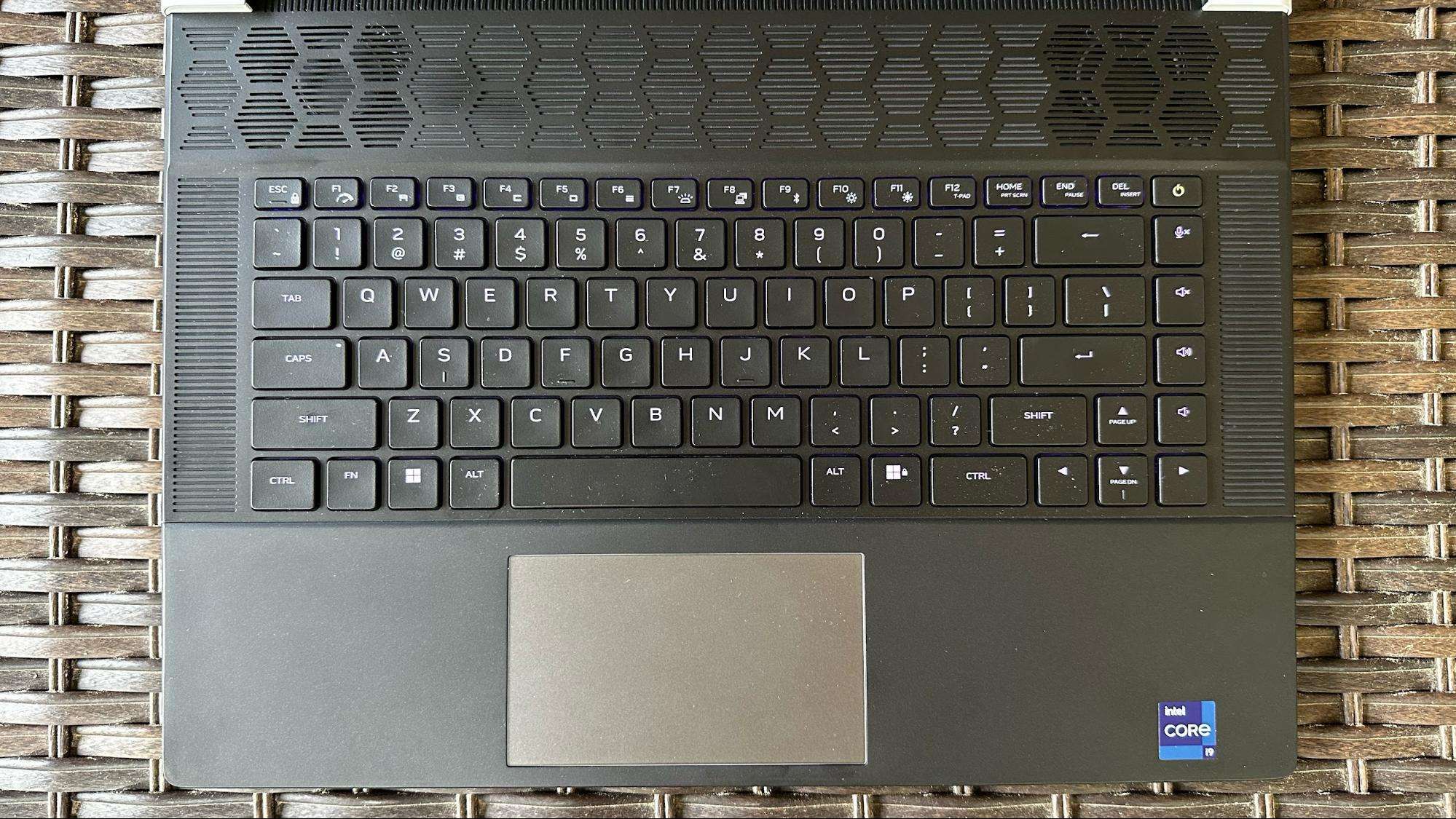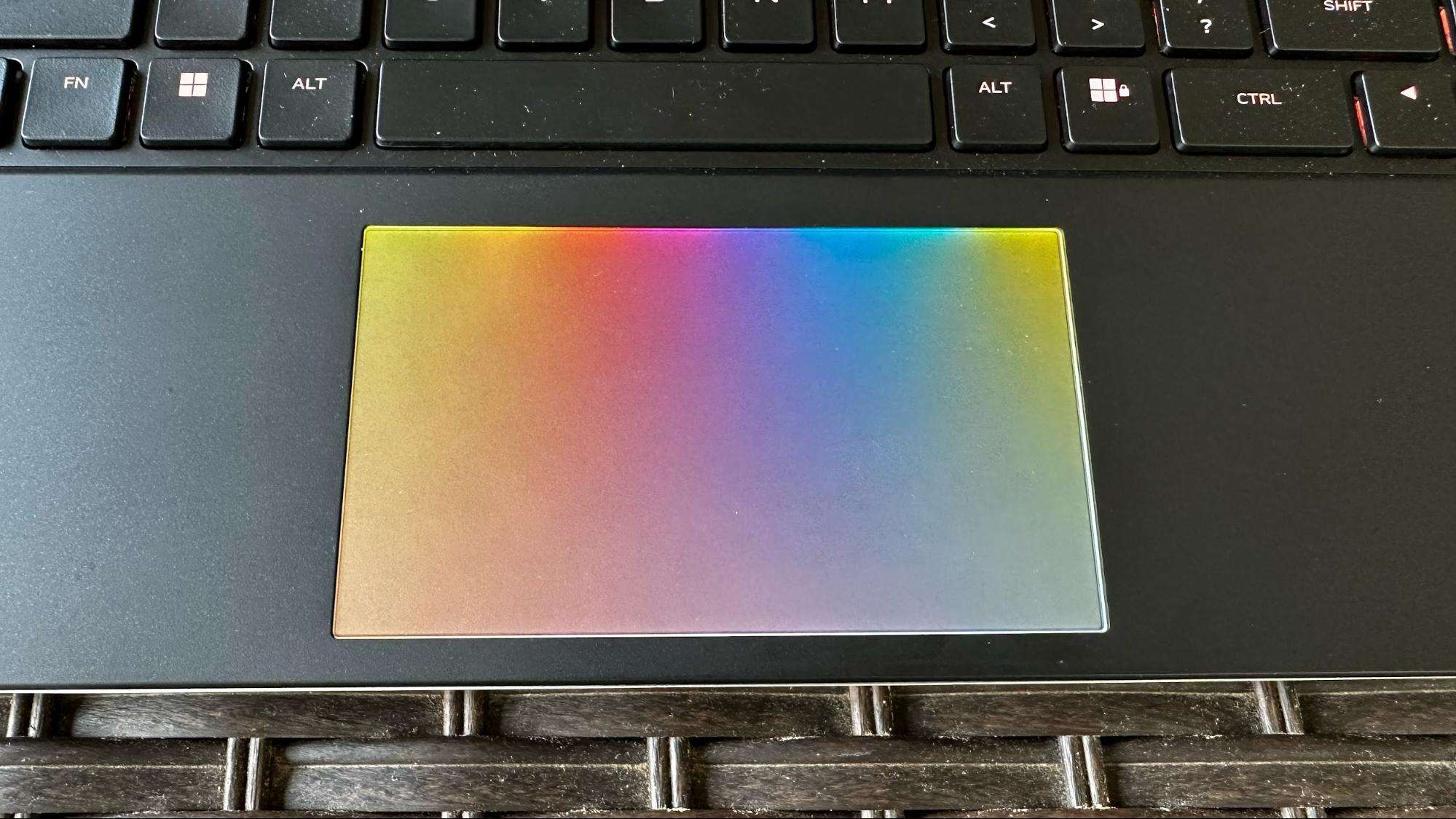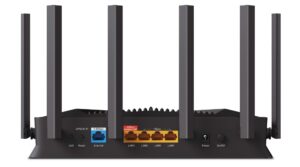Alienware x16 (2023) Review: Compromised Performance in a Pretty Shell
Alienware is a name synonymous with gaming hardware, and this year the company is upgrading its laptops with the Legion 3.0 design language. The newly released x14 and x16 feature magnesium alloy chassis designs and aluminum lids. Our review unit is a nicely equipped x16 with an Intel Core i9-13900HK processor, 32GB of LPDDR5-6000 memory, an Nvidia GeForce RTX 4080 GPU and a 1TB SSD.
Other features include a 16-inch QHD+ display (2560×1600) and something that I’ve never encountered before on a laptop: an RGB touchpad. While Alienware has offered this feature in the past, the x16 offers more customizable settings. Alienware packs all these features into a relatively thin and lightweight laptop, but is it enough to place it among the best gaming laptops on the market?
Alienware x16 Specifications
| CPU | Intel Core i9-13900HK |
| Graphics | Nvidia GeForce RTX 4080 Laptop GPU (12GB, 150W max graphics power, 2,280 MHz boost clock) |
| RAM | 32GB LPDDR5-6000 (Integrated) |
| Storage | 1TB NVMe PCIe 4.0 x4 M.2 SSD |
| Display | 16-inch IPS, 2560 x 1600 resolution @ 240 Hz |
| Nvidia G-Sync: (48-240 Hz) | |
| Networking | Wi-Fi 6E, Bluetooth 5.2 |
| Ports | 2x USB 3.2 Gen 1 Type-A, 1x USB 3.2 Gen 2 Type-C, 1x Thunderbolt 4, 1x HDMI 2.1, 1x mini DisplayPort, 1x 3.5 mm jack, 1x microSD slot |
| Camera | 1080p with Windows Hello |
| Battery | 90 WHr |
| Power Adapter | 330W |
| Operating System | Windows 11 Home |
| Dimensions (WxDxH) | (367.74 x 289.81 x 18.54 mm) |
| Weight | 5.67 pounds (2.52 kg) |
| Price (as Configured) | $3,349 |
Design of the Alienware x16
You won’t mistake the x16 for anything other than an Alienware laptop, and that’s a good thing for fans of the brand. The lid is made of aluminum and features a prominent alien head logo, while a large “X” is positioned in the lower right of the lid. The hinge area of the x16 is finished in a light gray plastic, which to my eyes, clashes with the aluminum finish. Alienware should have either finished the hinge in aluminum like the lid or at least painted the plastic to match. As it stands, it just looks oddly unfinished.
The x16’s bottom chassis plate is also made from aluminum, while a rounded, rectangular ring serves as the “feet” for the laptop, allowing airflow for the numerous honeycomb-style vents. The rectangular ring is a lighter shade of grey plastic.
The left and right sides of the x16 don’t have any ports,but feature vents to aid cooling. All the x16’s external ports are on the back panel. There you’ll find a 3.5 mm headphone jack, a microSD slot, one USB 3.2 Type-C port, one Thunderbolt 4 port, an HDMI 2.1 port, two USB 3.2 Type-A ports, a mini DisplayPort and a proprietary barrel-style power port.
Opening the lid puts the 16-inch QHD+ display front and center. The bezels are minimal along the sides and top. A larger bezel resides below the display and carries Alienware branding. Despite the large 16-inch frame, the x16 forgoes a dedicated number pad and instead features fan intake grills on either side of the RGB keyboard. A relatively small touchpad sits below the keyboard, featuring RGB lighting (more on that later). The keyboard deck is dark gray, with a shimmering “moon dust” effect that is primarily noticeable under direct light.
The x16 measures 14.36 x 11.41 x 0.73 inches and weighs 5.67 pounds. The MSI Raider GE78 HX measures 14.97 x 11.73 x 1.13 inches, making it quite a bit thicker than the x16, and it weighs 6.83 pounds. The Gigabyte Aorus 15X measures 14.1 x 10.8 x 0.78 inches and weighs 5.79 pounds, while the Asus ROG Strix Scar 18 tips the scales at 6.83 pounds with dimensions of 15.71 x 11.57 x 1.21 inches.
Gaming and Graphics Performance on the Alienware x16
The x16 uses a Core i9-13900HK processor, 32GB of DDR5-6000 memory and a GeForce RTX 4080 GPU. That’s a potent punch for this 16-inch display with a 2560 x 1600 resolution. However, we should note that the Core i9-13900HK in the x16 is at a disadvantage to the “HX” processors in this grouping due to fewer performance and efficiency cores (and a lower TDP), which can affect gaming performance.
However, the x16 had no trouble handling Cyberpunk 2077 in my hands-on testing, averaging around 78 frames per second at native resolution (2560 x 1600) with Ultra settings, ray tracing enabled and DLSS set to Quality. Turning off ray tracing saw the framerateincrease to 90 fps, but who would do that in a game this gorgeous?
We pitted the x16 against the MSI Raider GE78 HX (i9-13950HX, RTX 4080, 1600p), Gigabyte Aorus 15X (i9-13900HX, RTX 4070, 1440p) and the Asus ROG Strix Scar 18 (i9-13980HX, RTX 4090, 1600p) in all our tests.
In Shadow of the Tomb Raider (Highest), the x16 ranked behind the similarly-specced Raider GE78 HX at 137 frames per second versus 177 fps at 1080p. However, the difference was much smaller at 1600p, with the x16 hitting 101 fps versus 107 fps for the Raider GE78 HX. Not surprisingly, the ROG Strix Scar 18 was the top performer, with 181 fps at 1080p and 124 fps at 1600p.
Grand Theft Auto V (Very High) saw the RTX 4080- and RTX 4090-equipped systems clustered close together at 1080p resolution; the x16, Raider GE78 HX and ROG Strix Scar 18 were all within a few fps of each other. However, the ROG Strix Scar 18 flexed its muscle at 1600p, where its RTX 4090 allowed it to score roughly 50 percent higher fps than its closest rivals at 132 fps.
In Far Cry 6 (Ultra), the Raider GE78 HX zoomed to the top, hitting 121 fps at 1080p and 104 fps at 1600p. The x16 was well behind, achieving 97 fps and 86 fps, respectively. The ROG Strix Scar 18 wound up in a head-scratching second place with 107 fps at 1080p and 94 fps at 1600p.
Red Dead Redemption 2 (Medium) saw a return to form for the ROG Strix Scar 18, which topped all competitors with 123 fps at 1080p and 85 fps at 1600p. The Raider GE78 HX and x16 settled into their respective second and third positions, with the latter touching 100 fps at 1080p and 63 fps at 1600p.
It was more of the same with Borderlands 3 (Badass), with the ROG Strix Scar 18 leading the field with 165 fps/112 fps (1080p/1600p). The Raider GE78 HX again took second, with 153 fps/100 fps (1080p/1600p). The x16 took third with 137 fps at 1080p and 93 fps at 1600p.
On the Metro Exodus benchmark, the x16 averaged 87.14 fps throughout 15 runs at 2560 x 1600 with the RTX preset. During our benchmark testing, the Core i9-13900HK performance and efficiency cores averaged 3.61GHz and 2.43GHz, respectively, with a package temperature of 88.16 degrees Celsius (190.7 Fahrenheit). The GPU clocked in at 2.1GHz at 81.67 C (179 F).
Productivity Performance on the Alienware x16
The Alienware x16 comes equipped with an Intel Core i9-13900HK processor, 32GB of DDR5-6000 memory and a 1TB PCIe 4.0 SSD.
Starting with Geekbench 5, the Core i9-13900HK immediately has a disadvantage due to its “HK” processor. That used to be the top end, but now that’s been ceded to the newer “HX” chips. The Core i9-13950HX in the Raider GE78 HX has eight performance cores and 16 efficiency cores compared to the six performance cores and eight efficiency cores in the x16’s Core i9-13900HK. This is reflected in the x16 performing worse than its “HX” peers with a 14,919 multi-core score (1,929 single-core). For comparison, the Aorus 15X hit 2,007 for single-core and 18,129 for multi-core, while the Raider GE78 HX led all contenders with scores of 2,121 and 21,063, respectively.
However, the x16 eked out a win in our 25GB file transfer test, hitting 1,913.59 MBps versus 1,885.81 MBps for the second-place ROG Strix Scar 18 and 1,721.37 MBps for the Aorus 15X.
The x16’s core disadvantage once again reared its head in our Handbrake benchmark, which involves transcoding a 4K video to 1080p. Here, the x16 finished in four minutes and 50 seconds compared to four minutes and eight seconds for the Raider GE78 HX. However, the ROG Strix Scar 18’s took just two minutes and 49 seconds to perform the same task.
Display on the Alienware x16
The x16 uses a 16-inch IPS panel with a 2560 x 1600 (QHD+) resolution and a 240 Hz refresh rate. Alienware uses an anti-reflective coating on the display to reduce unsightly reflections outdoors or indoors under bright lights.
At 300 nits as measured by our lightmeter the x16’s display wasn’t as bright as the Raider GE78 HX (412 nits) and the ROG Strix Scar 18 (402 nits). That’s not to say I had a subpar experience with the display. It was quite the contrary, as I had no trouble enjoying the display indoors with copious overhead LED lighting or outside on my front porch with mid-day sunlight beaming down.

According to our colorimeter, the x16 covers 75.3 percent of DCI-P3 and 106 percent of the sRGB color gamut. These figures closely mirrored the Aorus 15X and ROG Strix Scar 18. However, the Raider GE78 HX surpassed those, reaching 115.4 percent for DCI-P3 and 163 percent for sRGB.
To test out the display, I queued up Throttle House’s comparison test of the BMW M2 versus the Porsche Cayman GTS and Volkswagen Golf R. My eyes were immediately drawn to the Cayman GTS, which was painted in Python Green. I had previously watched the video on my desktop Dell S3221QS 4K monitor, but the x16’s display breathed new life into the color.
While the green looked somewhat duller and flatter on my Dell monitor, the x16 gave it a deeper, more rich green that is truer to what it looks like in real life (yes, I’ve seen Porsche’s Viper Green up close and in person on more than one occasion, usually on 911s). Little details stood out clearly and accurately, like the bright red stitching along the interior doors and the GTS stitching on the seat headrests.
I also spent plenty of time playing Cyberpunk 2077 and Overwatch 2. I spent most of my time in the bright and airy Colosseo map while playing Overwatch 2 and hanging around the dark, desolate despair of Vista Del Rey in Cyberpunk 2077. Both games looked good on the x16 in just about every possible situation.
Keyboard and Touchpad on the Alienware x16
Our review unit came equipped with an AlienFX mechanical keyboard with per-key RGB backlighting. The clicky keys and the sound they generate is like music to my ears. It reminds me of my younger days using classic IBM Model M keyboards in middle and high school.

Despite the 16-inch form factor of the x16, Alienware opted not to include a number pad. Instead, you’ll see nicely spaced-out keys and vents on either side of the keyboard covering one of the system’s four cooling fans.
Using my go-to typing speed website, keyhero.com, I achieved 90.51 words per minute with 98.81 percent accuracy. For comparison, I mustered just 75 wpm and 90.61 percent accuracy with the similarly sized Samsung Galaxy Book 3 Ultra and 67.81 wpm and 97.1 percent accuracy with the Asus ROG Strix G16.

While RGB keyboards are nothing new, the RGB touchpad was something that I haven’t yet encountered on a laptop. The edge-lit RGBs add a colorful touch to an otherwise mundane touchpad. I opted for the Rainbow Wave effect, which lasts roughly 10 seconds after you last used the touchpad before it turns off on the High duration setting. The touchpad measures just 4.4 x 2.6 inches, which is a bit small to me for a 16-inch laptop. While you’re better off using one of the best gaming mice for play time, it’s nice to have a full-sized touchpad for actual work.
Audio on the Alienware x16
The Alienware x16 has no shortage of speakers. There are two 2-watt tweeters located towards the back of the chassis and four 3-watt speakers right up front under the palm rest. These speakers can get very loud, easily filling my upstairs home office. Even with the sound cranked to 100%, distortion is not discernable, although my ears begged for mercy at that volume.
Gunfire and ambient noises were clear and crisp in Cyberpunk 2077, with gunshots reverberating throughout my office. It was a similar experience in Red Dead Redemption 2, with the clear sound of horseshoes hitting the pavement and flesh being torn apart when shooting an enemy in the chest at close range.
I also pulled up one of my favorite tracks from Keane, “Black Burning Heart.” Tom Chaplin’s voice soars on the track, and you can even make out the subtle gasps of air he takes before each verse starts. It’s something that I’ve always noticed with Tom’s vocals (across multiple albums) while listening to tracks with headphones on, but it’s one of the few times that I could make out that peculiarity from laptop speakers.
Upgradeability of the Alienware x16
The x16’s bottom panel is held in place by six Philips head screws and detaches easily. Once removed, the battery and dual M.2 SSD slots are easily accessible (one of which is occupied by the system’s 1TB PCIe 4.0 SSD). The Wi-Fi/Bluetooth combo card is also within reach to the left of the M.2 slots.
Unfortunately, the memory is soldered onto the motherboard, so there are no future upgrades in store once you’ve selected your memory configuration at purchase time.
Battery Life on the Alienware x16
The x16 uses a 90-kWh battery, leading to good battery life versus the competition. The x16 managed to endure for five hours and 37 minutes on our battery test, which included browsing the web, streaming videos and running OpenGL tests with the screen to 150 nits.
The Aorus 15X was the next-closest competitor at five hours and 20 minutes, while the Raider GE78 HX lasted just two hours and 32 minutes during the test.
Heat on the Alienware x16
We can only assume that Alienware went with the fewer cores of the Core i9-13900HK to cut down on the heat output in this thin chassis. However, the heat levels are still high, even with four cooling fans exhausting air from the chassis. While gaming, my legs got uncomfortably hot from the heat being transferred to the aluminum bottom panel. Heat also poured out from the area above the keyboard where the two rear fans are located.
Our testing showed that temperatures measured 96.1F (35.6 C) between the G and H keys while running the Metro Exodus benchmark. The touchpad measured 78.4 F (25.8 C), while the bottom aluminum panel measured 116.8 F (47.1 C). However, the hottest points measured were on the underside near the rear exhaust vents at 129.7 F (54.3 C).
Webcam on the Alienware x16
The x16 features a 1080p RGB+IR webcam with Windows Hello support, and overall image quality was excellent. It’s a clear step up from the shoddy 720p webcams we’ve been subject to over the years. In this case, the camera has remarkably low noise levels, even in low-light conditions. Details were easily picked up by the camera, and colors were well represented. At first, my skin color was skewing slightly red, and there were some weird halos around my overhead lights – then I realized that a thin piece of protective tape was still in place over the sensor. With that removed, the crisis was averted.
As I peered closer into the webcam, I clearly noticed that it was time to get my electric shaver out to tackle this balding head. The x16 doesn’t have a physical privacy shutter or keyboard shortcut to turn off the webcam, but a white LED does come on when the camera is active.
Software and Warranty on the Alienware x16
The x16 is loaded with four Alienware-specific apps: Alienware Command Center, Alienware Customer Connect, Alienware Digital Delivery and Alienware Update. Alienware Customer Connect and Alienware Update are pretty much self-explanatory. Alienware Digital Delivery is where you’ll find the software you purchased with your system.
However, most of your time will be spent in Alienware Command Center. This is where you can monitor system performance/vitals, set power profiles, and control AlienFX lighting (among other things).
Other installed apps included Dolby Access for adjusting Dolby Atmos and Dolby Vision settings along with the Killer Intelligence Center for monitoring the Wi-Fi 6E card and network traffic. There are also several installed shortcuts for things like WhatsApp, ESPN, Instagram and Spotify.
The Alienware x16 comes with a one-year manufacturer warranty.
Configurations of the Alienware x16
The x16 is available with a Core i7-13620H, i7-13700H or i9-13900HK processor paired with 16GB or 32GB of DDR5-6000 memory. The full range of Nvidia Lovelace GPUs are available, ranging from the GeForce RTX 4050 to the RTX 4090. Likewise, customers can choose from 512GB to 4TB of internal storage and 165Hz or 240Hz refresh rate options for the 16-inch QHD+ display.
A base system with a Core i7-13620H processor, 16GB of DDR5, 512GB SSD, RTX 4050 and 120Hz QHD+ panel costs $1,999. A fully decked out system with a Core i9-13900HK, 32GB DDR5, 4TB (2x 2TB in RAID-O), RTX 4090, 240Hz QHD+ display and an AlienFX mechanical keyboard costs $4,149.
Our review unit is specced with a Core i9-13900HK, 32GB of DDR5, 1TB SSD, RTX 4080, 240Hz QHD+ display and the AlienFX mechanical keyboard. It’s priced at $3,349.
Bottom Line
The Alienware x16 is a bit of a mixed bag when it comes to performance, and that’s due to the choice of the Core i9-13900HK processor versus the “HX” offerings in the competing laptops that we tested. This processor selection allows the x16 to come in at just 5.67 pounds with a frame that is just 0.73 inches thick.
Compared to the MSI Raider GE78 HX with a Core i9-13950HX and RTX 4080 at the same resolution, the x16 came up with the short end of the stick nearly every time. In addition, the chassis of the x16 gets uncomfortably hot in your lap while gaming and even the top portion of the keyboard deck gets noticeably hot. The Raider GE78 HX’s advantage in performance comes at the cost of a thicker chassis that weighs roughly a pound more.
But the biggest detractor is the price, which as tested, came in at $3,349. You can get the much faster but admittedly heavier Raider GE78 HX for $2,999. You’ll have to decide if the slightly slimmer profile and lower weight of the x16 are worth having the RTX 4080 handicapped by its processor.
MORE: How to Buy a Gaming Laptop
MORE: Best Gaming PCs
MORE: Best Ultrabooks and Premium Laptops














